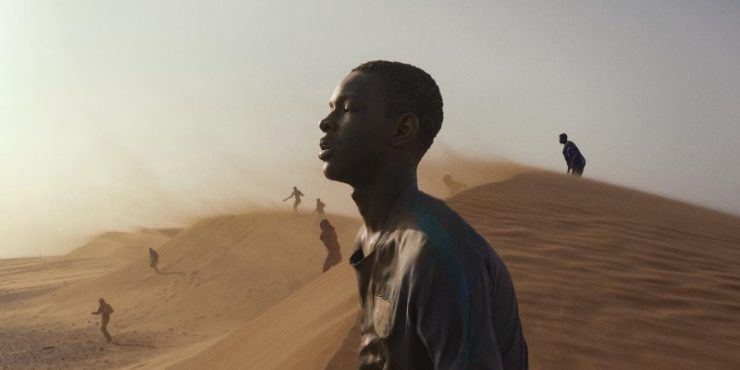In the first twenty minutes of Io capitano, the latest from Italian filmmaker Matteo Garrone, we see two teenaged boys living in West Africa who dream of making the treacherous journey to Europe to pursue a music career. Their thought process is naive, and that ignorance of the harsh reality of the migrant’s journey is made blatantly obvious. We know that Garrone is setting these boys up for a rude awakening, a maturity process steeped in death, torture, and dehumanization. Io capitano is meant to be grueling, a brutal detailing of the contemporary migrant crisis. These young men let their dreams lead them straight into a walking nightmare, and Garrone wastes no moment in letting us know just how harrowing this experience will be.
Seydou Sarr and Moustapha Fall play cousins growing up in Senegal. They live in poverty but not in anguish. Escaping oppression or abuse is not their motivation for leaving home, but they do want to explore opportunity in Italy, where their dream is to become world famous singers. “We’ll have white people asking for our autograph,” Moussa exclaims. Seydou’s mother (Venus Gueye) already fears her son abandoning her, and that fear becomes reality, when the cousins take a stash of saved-up cash and begin their journey across the Sahara to Libya, where Sicily is just a boat ride away. Almost immediately, their trip proves less glamorous than originally anticipated. The boys are whisked away by men promising a quick and safe journey across the desert, which instead is a bumpy drive in a pick-up truck along with dozens of other African migrants.
The boys are not taken directly to Libya, instead dropped off in the middle of the desert, forced to follow a guide on foot for days, before being met with gun-wielding men who offer an ultimatum: give us all your money or we will torture you in prison. This is a common theme, scores of Africans being passed between various white and Arabic groups who threaten violence when a bribe is not immediately forfeited. Seydou and Moussa are forced in and out of trucks and various prisons, shot at and tortured, sold into servitude, and finally sent out onto the ocean, forced to captain a ship of a hundred migrants to Italy (hence, the title) by themselves. The story is, by design, difficult to watch, and requires constant suffering in order for its limited plot to take shape. Marrone attempts moments of kindness and levity, but they’re blunted by the sheer horror of what happens to the boys.
Io capitano reminds me of the 2017 Kathryn Bigelow film Detroit, another movie by a white filmmaker that tried to graphically depict the terrors of racism and how it works to break the will of its victims. In both films, the directors can’t seem to fathom telling their stories without an endless torrent of Black pain, an upsetting parade of moral degradation. Io capitano at least gives its characters moments of mystical escape. A scene where Seydou imagines a dead migrant woman continuing her journey while floating on air gives one a glimpse of a much more humane and holistic approach to this story, but those moments are so seldom you almost question their inclusion at all. The performances from Sarr and Fall are incredible, but Marrone’s vision of their lives is too narrow to make a compelling story. He can only envision them through their trauma, and Io Capitano can’t break through that.
Directed by Matteo Garrone










